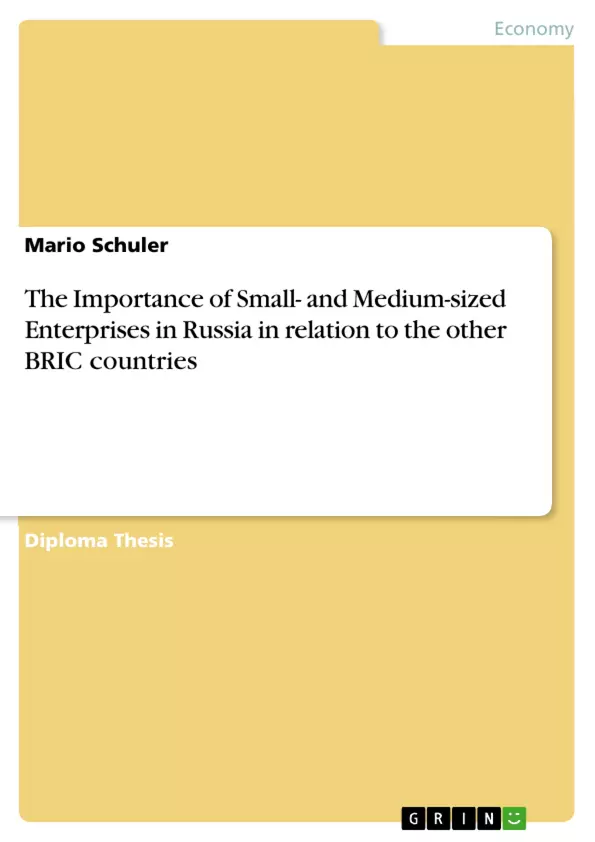This diploma thesis provides an overview of the contemporary debate about the importance of small and medium-sized enterprises (SMEs) in the BRIC countries with a special focus on Russia. Conclusions are based on historical perspectives showing that there are huge country-specific divergences and concepts of supporting SMEs. In contrast to multi-national corporations (MNCs), which are not uncommonly supported by the government of the fast-developing country they stem from respectively they are entering and can continue their triumph easily, SMEs often face tremendous difficulties to establish themselves. While the engine of the economy of industrialized countries are SMEs, it seems as if BRICs, especially Russia, struggle to provide appropriate incentives for the foundation of domestic SMEs in order to boost the economic driving force which interviews.
Table of Contents
- Introduction
- Literature Review
- BRIC Countries
- Definition BRIC
- Emerging Markets
- Method of Selecting BRIC Countries
- BRICS or BRICS?
- Macroeconomic Environment
- Small- and Medium-sized Enterprises (SMEs)
- Definition and Classification of SMEs
- Importance of SMEs
- Technology Changer
- Economy Stimulator
- Niche Marketer
- Job Generator
- Entrepreneurial Motivations
- Barriers in SME Development
- SMEs in Brazil, India and China compared to SMEs in Russia
- History of Russia's SME Tradition
- Critical Issues hampering Russia's SME Growth Potential
- Business Reforms in Russia
- Research Question
- Empirical Study
- Contingency Theory
- Definition and Classification
- Various Approaches
- PESTEL Analysis
- Research Methodology
- Data Collection and Sample Selection
- Findings
- Pre-foundation Period
- Motivators
- Opportunities
- Threats
- General Attitude of Russians towards Self-employment
- Summary
- Foundation
- Location decision
- Problems faced by the Founders during the Foundation
- Time, Money, and Efforts required for the Foundation of the Company
- Assistance by Government or other Institutions
- Summary
- Barriers to a Sustainable SME Sector Growth
- Perceived Factors hindering SME Growth in Russia
- Current problems faced by the participants' companies
- Simplification measures set by the government over the years
- Summary
- Future Outlook
- Expected simplification measures
- Growth plans
- Summary
- Results from the PESTEL Analysis
- Pre-foundation Period
- Conclusions and Further Research
- Conclusion
- Limitations
- Further Research
Objectives and Key Themes
This diploma thesis aims to analyze the significance of small and medium-sized enterprises (SMEs) in the BRIC countries, with a particular emphasis on Russia. It examines historical perspectives to highlight the distinct national variations and approaches to supporting SMEs. It explores the challenges faced by SMEs in establishing themselves compared to multinational corporations (MNCs) and analyzes the factors that hinder SME growth in Russia.- The importance and role of SMEs in the BRIC countries
- The specific challenges faced by SMEs in Russia compared to other BRIC nations
- The historical evolution of SME support policies in Russia
- The impact of government incentives on SME growth
- The factors that hinder the development of a sustainable SME sector in Russia
Chapter Summaries
The introduction provides an overview of the thesis's scope and objectives, focusing on the importance of SMEs in the context of BRIC countries, particularly Russia. The literature review explores the definition and significance of BRIC countries, their emerging market status, and the selection methods used to identify them. It also delves into the definition and classification of SMEs, highlighting their crucial role in economic development and the various challenges they face. Chapter 2 examines the importance of SMEs in general, discussing their impact on technology, economic growth, niche markets, and job creation. It analyzes entrepreneurial motivations, barriers to SME development, and the specific challenges faced by SMEs in Russia compared to Brazil, India, and China. The chapter explores the historical context of SME development in Russia, critical issues hindering growth, and government-led business reforms. Chapter 3 presents the research question that guides the thesis and outlines the empirical study conducted to address it. Chapter 4 introduces the contingency theory, explaining its definition, classification, and various approaches. Chapter 5 delves into PESTEL analysis, a framework used to assess the external environment of a business. Chapter 6 outlines the research methodology, including data collection techniques and sample selection. Chapter 7 presents the findings of the empirical study, exploring the pre-foundation period, the process of establishing a company, barriers to sustainable SME growth, future prospects, and insights from the PESTEL analysis.Keywords
This diploma thesis focuses on the economic impact of SMEs in the BRIC countries, particularly in Russia. Key terms and concepts include small and medium-sized enterprises, BRIC countries, emerging markets, economic growth, entrepreneurial motivation, barriers to SME development, government incentives, business reforms, PESTEL analysis, and contingency theory.- Quote paper
- Mario Schuler (Author), 2014, The Importance of Small- and Medium-sized Enterprises in Russia in relation to the other BRIC countries, Munich, GRIN Verlag, https://www.grin.com/document/273892



